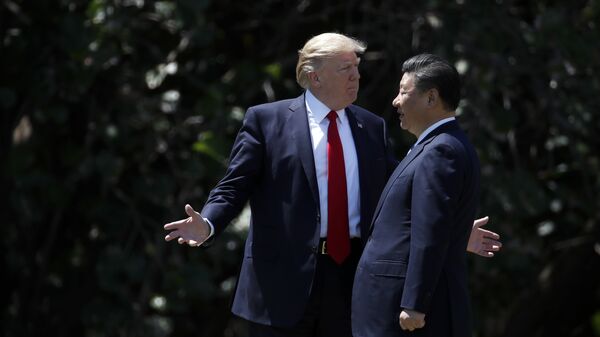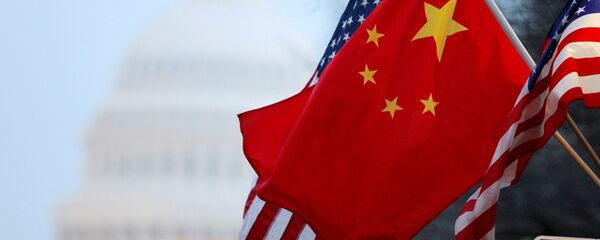MOSCOW (Sputnik), Tommy Yang — Chinese Foreign Ministry Spokesperson Lu Kang said on Wednesday that US Secretary of State Rex Tillerson plans to visit China on September 30. Tillerson is expected to meet with senior Chinese officials and make preparations for Trump’s first state visit to China later this year.
Trump drew a massive wave of criticism domestically this week over his outlandish comments on NFL stars kneeling in protest to the US national anthem, while engaging in a war of words against top NBA stars including Lebron James and Chris Paul, after announcing on Twitter that he had withdrawn his invitation to NBA star Stephen Curry to visit the White House with his team over Curry's criticism of the US leader. The Warriors decided not to visit the White House without their leader, breaking with the tradition to meet the President after winning a championship.
China Could Help to Raise Trump's Voter Base
"Trump’s alleged connection with Russia makes it impossible for him to improve US-Russia relations as he had expected before taking office. He also started to lose support from his own Republican Party, as there seems to be no hope of repealing Obamacare. He also dug himself a huge hole when it comes to racial problems. Now, he can only rely on China to help improve the economy of the struggling mid and western states, where most of his supporters came from," Xu Guoqi, a professor specializing in US-China relations at Hong Kong University, told Sputnik.
The Hong Kong-based expert suggested that improving US-China relations could be the only bright spot left for Trump’s presidency.
"Who can help improve the US economy? It’s the Chinese. If Trump messes up relations with China, who will invest in the United States? Improving the US economy could be the last ‘life-saving straw’ for Trump. Facing troubles from all sides, China has become the only country that could bring some bright spots to Trump on economic issues or the nuclear crisis on the Korean Peninsula," Xu said.
Xu pointed out that when Trump visits China, he could still enjoy the glamour of being a top politician, while he has almost become "a laughing stock" on the nightly TV talk shows in the United States.
Maximizing US Interests
However, other Chinese experts argued that Trump may prove to be a very difficult to handle opponent for Chinese leaders, as he is a businessman who holds maximizing US interests as his bottom line.
"Previously, the United States would raise human rights issues with China. Under the Trump administration, it’s just about discussing North Korea and trade issues with Beijing. Compared to previous US administrations, Trump is actually difficult to handle because he is a businessman who focuses on maximizing his profits. Businessmen know how to make compromises, but the premise [for Trump to do so] is maximizing US interests. He would never make a compromise that could hurt US interests. Many people view Trump as a businessman who knows how to make compromises. But they forgot the premise for such compromises is to maximize US interests," Deng Yuwen, a political commentator and international relations scholar, who is currently a senior researcher at the Charhar Institute Beijing, told Sputnik.
Deng noted that Trump rejected a steel deal with China endorsed by US commerce secretary Wilbur Ross in July.
"It shows Trump is not like his predecessor [Barack] Obama, who would listen to his advisers. Trump seems to hold his opinion strongly and needs to be pandered to," he said.
But when North Korea defied international pressure and continued to advance its nuclear arms program, Trump expressed disappointment in China for failing to rein in its increasing aggressive neighbor. Despite reaching a package of trade deals in May, the United States and China failed to make further progress in bilateral relations by the end of the 100-day plan, which ended in July.
Trump used harsher rhetoric on trade issues with China shortly after, signing an executive memo in mid-August to initiate an investigation into China’s theft of US intellectual property using Section 301 of the Trade Act of 1974. Chinese Foreign Ministry Spokesperson Hua Chunying responded by saying that a trade war has no future and there will be no winner and only losers in such a situation. Moreover, China’s Ministry of Commerce said Beijing is ready to launch counter-measures to defend its lawful rights.
Risk of Misinterpretation
The Beijing-based expert warned that if both the United States and China have misinterpretations of what the other side views as their key interests, this could cause big problems in bilateral relations.
"On minor or trivial issues, China could make compromises. But on other issues that touch China’s key interests, such as territorial and sovereignty issues, or questions related to political system, it would be difficult for Beijing to take a step back," Deng said.
The Chinese scholar gave an example that if China views disputes in the South China Sea as touching its key interests, while the United States does not share the same view, there could be escalating conflicts between the two nations.
The expert believes the trade issue is not a key interest for China and Beijing could make compromises on that front.



